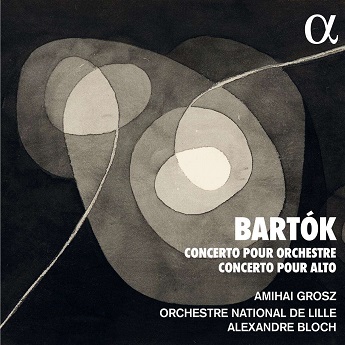Generell kann man festhalten, dass Alexandre Bloch dem Bartok-Konzert eine menschliche Seite gibt und die Musik nicht kühl abspult. Auch schärft er den Klang nicht und lässt insbesondere die Blechbläser nicht schneidend werden.
Der erste Satz beginnt sensuell und geheimnisvoll und wechselt in den Stimmungen zu vergnügt und andererseits auch melancholisch. Der zweite Satz ist hinreißend charmant und drollig.
Was Bloch in die Elegia an Stimmungen hineinzaubert ist bemerkenswert, es ist eine regelrecht Achterbahnfahrt der Gefühle, aus düstersten Abgründen bis in lichteste Höhen, voller berstender Spannung. So differenziert hört man diesen Satz selten.
Das Intermezzo bringt wiederum viel Menschlichkeit und Humor.
Das Finale legt Bloch als virtuoses Orchesterstück an und er lässt sein Orchester virtuos glänzen in einem atemberaubend spannungsvollen Spiel.
Hervorgehoben werden müssen auch die orchestrale Transparenz sowie die herausragende Qualität des Orchesterspiels. Das Orchestre National de Lille zeigt sich als hochkarätige Formation von unbestritten internationalem Niveau.
Bela Bartoks unvollendetes Bratschenkonzert wird vom israelischen Bratscher Amihai Grosz sehr verinnerlicht, im langsamen Satz mit fast überirdischer Ruhe gespielt. In den Ecksätzen ist die Musik alert und sehr farbig. Grosz wird kongenial begleitet vom Orchester unter Alexandre Blochs inspirierter Leitung.
In general, it can be stated that Alexandre Bloch gives the Bartok Concerto a human side and does not coolly unwind the music. Nor does he sharpen the sound or allow the brass in particular to become sharp.
The first movement begins sensually and mysteriously, changing moods to playful and, on the other hand, melancholy. The second movement is adorably charming and droll.
What Bloch conjures up in the Elegia in terms of moods is remarkable; it is a veritable roller coaster ride of emotions from the darkest abysses to the lightest heights, full of bursting tension. One rarely hears this movement so differentiated.
The Intermezzo again brings much humanity and humor.
Bloch presents the finale as a virtuoso orchestral piece and he lets his orchestra shine in a breathtakingly exciting performance.
The orchestral transparency and the outstanding quality of the orchestral playing must also be emphasized. The Orchestre National de Lille shows itself to be a top-class formation of undisputed international standard.
Bela Bartok’s unfinished viola concerto is played by the Israeli violist Amihai Grosz with great interiorization, in the slow movement with almost unearthly calm. In the corner movements the music is alert and very colorful. Grosz is congenially accompanied by the orchestra under Alexandre Bloch’s inspired conducting.




















